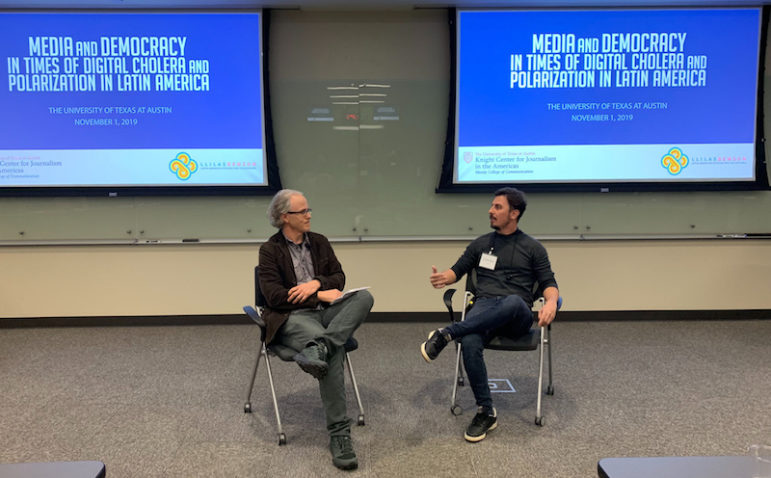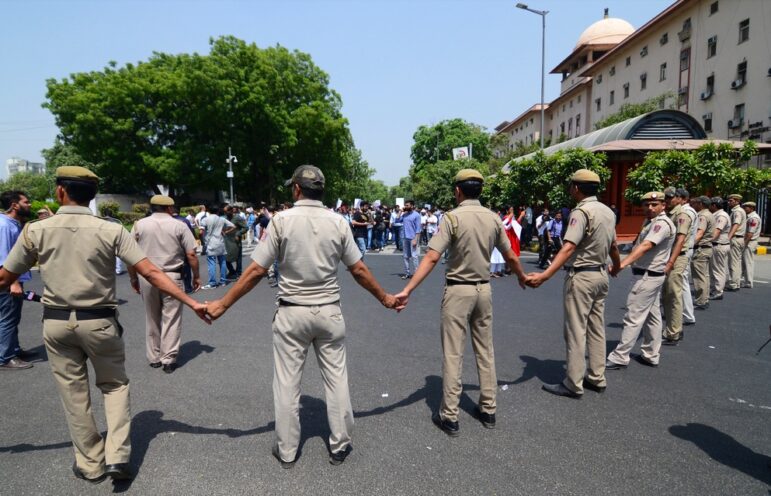

Seth Garfield (left) and Leandro Demori (right) talk about polarization in Brazil. Photo: Teresa Mioli / Knight Center
Intercept Brasil’s Editor Demori on How Journalists Work Amid Attacks

Seth Garfield (left) and Leandro Demori (right) talk about polarization in Brazil. Photo: Teresa Mioli / Knight Center
Never in the history of Brazil have journalists and digital media been attacked the way they are being targeted now, said Leandro Demori, executive editor of investigative site The Intercept Brasil. And this is all happening in the context of extreme political polarization in the country.
When social protests broke out in Brazil in 2013 over a 20-cent increase in the bus ticket, Demori said, the left – which ruled the country for the previous 15 years – lost the support of the population in the face of the crisis and right-wing groups seized the opportunity. Since then, Brazil has experienced political and social polarization that has only become more acute with the entrance of the new government in 2019.
Demori was one of the journalists invited to the event “Media and Democracy in Times of Digital Cholera and Polarization in Latin America,” which was organized by the Knight Center for Journalism in the Americas and the LLILAS Benson Latin American Studies and Collections at the University of Texas at Austin. The conference took place on Nov. 1, 2019, and was broadcast via Facebook Live.
According to the journalist’s explanation, the right-wing groups that entered the scene when the protests began six years ago “recruited young people on the street, invested time and money in them, and taught them how to colonize social networks with one strategy: mocking.”
This digital militia has since begun to attack various people on social networks, Demori said, including activists, politicians, and journalists. Demori was one of those affected.
For example, The Intercept Brasil journalist said that several Twitter accounts published his old tweets, took them out of context, and launched a smear campaign against him. Demori reported that he had to temporarily close his account but that shortly after doing so he decided to defend himself and expose the aggressors in that social network.
In the last two years, The Intercept Brasil has revealed important leaks of information that have involved several political and business figures in the Lava Jato case, the region’s biggest international scandal of political and corporate corruption, involving Brazilian construction company Odebrecht.
Since June, The Intercept Brasil journalists have had private security guards so they can walk safer on the streets and in the office, Demori said. This was a result of the publication of the new Vaza Jato series. The Intercept Brasil published a leak of messages along with investigative reports that point to alleged collaboration between judges and prosecutors investigating the Lava Jato scandal.
From then on, Demori said, they began to notice that they were followed and filmed on the streets by strangers. The government began to threaten them with the expulsion of The Intercept founder Glenn Greenwald from Brazil and with arresting Demori. The government reinforced its discourse against the press.
“We never felt so unsafe as we feel today,” Demori said.
Another phenomenon taking place both in Brazil and in many other countries in Latin America and around the world is disinformation. During the Brazilian presidential elections in October 2018, the volume of misleading and false news that spread on social networks was unprecedented in Brazil’s past, The New York Times en Español reported. That environment of disinformation and polarization continues.
In that hostile context and with a journalistic guild that isn’t very united in the country, Demori explained, what they are trying to do from their media outlet is to get closer to people, telling the news and complex stories in simple terms, and being less intellectual.
“Ninety-five percent of the press in Brazil writes and talks to intellectuals. It’s really hard to understand what is written in the newspapers; it’s full of bureaucratic words and clichés,” Demori said.
According to the journalist, about 70% of Brazilians cannot read and understand a simple article. “So, you need to talk to them, through videos, maybe, Whatsapp, GIFs, images, cartoons. You need to try to understand what they need,” Demori said.
According to the evaluation of the UNESCO Functional Illiteracy Indicator in 2018, 71% of Brazilians fail to read with coherence and critical understanding, the newspaper Estadão published.
One of The Intercept Brasil’s strategies to cover news more locally and reach the less privileged people who live on the periphery of large cities is to hire people from favelas in its newsroom.
Last year, the Intercept Brasil began to hire people from the favelas Maré and Jacarezinho as interns and reporters, and are now looking for an editor to work with them locally. In that sense, Demori said, “We are not changing things tomorrow, but I think it will work.”
This article first appeared on the Knight Center for Journalism in the Americas site and is reproduced here with permission.
 Paola Nalvarte is a Peruvian journalist and photographer in Austin, Texas, who focuses on covering the Andes region. In Peru, she worked for Italian news agency ANSA, on the economic newsdesk of the daily Expreso, and for 10 years has worked on various projects doing picture editing and research for one of the world’s oldest Spanish-language papers, Peru’s El Comercio.
Paola Nalvarte is a Peruvian journalist and photographer in Austin, Texas, who focuses on covering the Andes region. In Peru, she worked for Italian news agency ANSA, on the economic newsdesk of the daily Expreso, and for 10 years has worked on various projects doing picture editing and research for one of the world’s oldest Spanish-language papers, Peru’s El Comercio.









